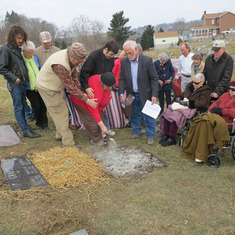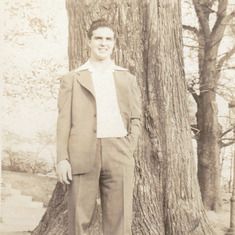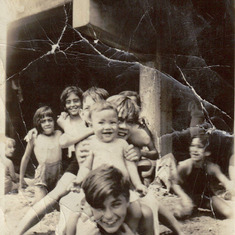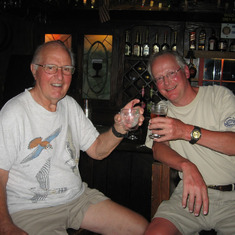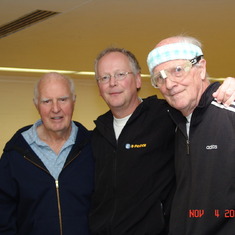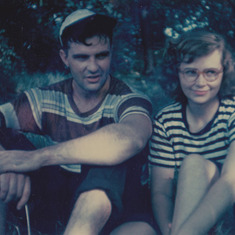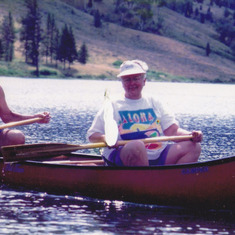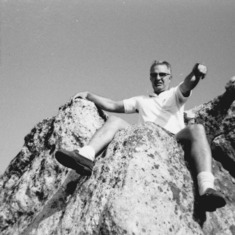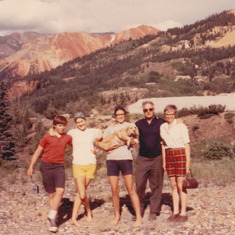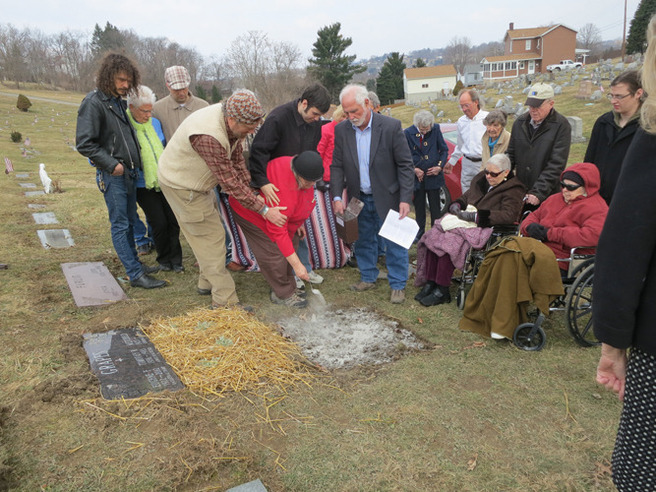Eulogy – by Kristin Grapes
GENE GRAPES - KING OF REDSTONE
One month before Dad moved on from this life he was crowned King of Redstone Highlands Senior Living Community. Every year the King and Queen are elected by Redstone staff and residents. The royal couple are chosen based upon which man and woman out of all the residents are the most friendly and well-liked. The Coronation Festival is like the combination of a high school homecoming celebration and a small town parade. There are marching bands, fancy cars, hot dogs, balloons, music, and general hoopla.
Last year’s Coronation Festival fell on a perfect summer day. When the parades had ended and everyone was finished eating, it was time for the Coronation Ceremony to begin. With much fanfare, the Queen’s identity was announced to her cheering subjects. Then it was time for the King’s identity to be revealed. I imagine Dad was quite surprised to hear his name coming over the loudspeakers, given that he had always been a modest person.
But Dad was also a prudent person. Before accepting the crown and scepter he wanted to know what he was getting himself into. “What are my duties?” he challenged. I can just see his deadpan expression and hear the skepticism in his voice as he gleefully threw a curve to the master of ceremonies. That wry, quick humor was one of the qualities that drew people to him.
What Dad’s duties were is lost to history. We do know that, in the end, he agreed to ascend to the throne. There are many photos in the Redstone archives of Dad smiling and waving regally to the crowd as he was wheeled before them under the Redstone portico.
I would venture to say that those who knew Dad are not surprised that he was crowned King of Redstone. He was a warm, generous man who lived his life with honor and integrity. Even Mama and Papa (our Ackermann grandparents) changed their minds about him. He went from being a “Brooklyn bum” to someone they loved and depended upon. I remember Papa and Dad sitting many hours under our apple tree as Papa confided in him about the challenges of retirement. And Mama did not hesitate to call Dad when she needed help around the house or with her finances.
Dad’s employees at WWPatterson company also loved him. They never allowed the labor unions to organize their shop. They knew that Dad would see to their welfare better than any union ever would.
Dad’s kindness did not lessen with age. After his death, a nurse at Redstone stopped me to offer her condolences. She said that it had been a rough time in her life when she started working at Redstone the previous year. She grew misty-eyed as she said, “Your dad was the first friend I had here.”
INSPECTIONS AND CROCODILES
Another wonderful quality of Dad’s was his playfulness. He could make almost anything fun. Probably all of us have grumpy memories of having to do Saturday morning chores as kids. That happened in the Grapes home as well. We had to “redd up” (western Pennsylvania dialect for “clean up”) the living room every weekend. As you can imagine, five kids, a couple of cats, and a dog that shed like a buffalo can make quite a mess. When we were finished Dad came in to inspect our work. He got down on his hands and knees and slowly crawled across the floor, looking for the slightest speck of dust, fur ball, or scrap of paper we might have missed. If such was spotted one of us raced ahead to remove the offending item while the other four swarmed Dad to keep him from getting there first. Not surprisingly, the inspection usually lasted longer than the redding up!
Not only did we Grapes kids have to survive weekly Inspections, we also had to do battle with the dreaded Crocodile. We never knew when the monstrous reptile would slither out of the murky depths and climb onto the living room couch. Once there it always stretched out to its fullest length and tightly wedged itself against the couch cushions. It loved that soft, comfortable couch and was determined not to be dislodged. Of course, the situation was intolerable. The couch certainly could not accommodate both the Grapes kids and the horrible creature. Our only option was to leap over the Crocodile and onto the couch. Pressing our backs against the back of the couch we jammed our feet against the Crocodile. Shrieking encouragement to one another we strained with all our might to dislodge the awful beast. Somehow we always won these contests. However we knew that the victory was really only a temporary reprieve. At some random moment when we least expected it, there it would be. Its maw gaping open and its tiny slitted eyes fixed upon us, ready to do battle once again.
GYPSY AND LOBO
Dad’s talents were not limited to creating new contests which pitted his offspring against him. He was also a gifted story-teller. We loved it when mom would host her bridge club. To get us out of the living room where the women were gathered, Dad would take us upstairs to his and mom’s bedroom. We clambered up on the bed and sat lined up against the headboard. Dad would then regale us with the latest installment of The Story of Gypsy and Lobo.
Gypsy was a St. Bernard who lived in a village in the Far North. Lobo was a wolf who prowled the forest that pressed up against the small settlement. Lobo was a classic alpha male. He was strong, handsome, supremely confident, big-hearted and adventurous. Gypsy, on the other hand, was big-boned, clunky, generous to a fault, and prone to drooling. Though they made an odd couple, they also were a perfect couple. Before long they had a litter of puppies out of wedlock.
The small family was often in danger from the townspeople, including Gypsy’s human, due to their prejudice against wolves. Other dangers, such as flash floods, grizzlies, and cougars, also imperiled them. But somehow they always survived, just in time for us to go to bed.
HANDBALL VERSUS JUILLIARD
Dad’s parent’s marriage fell apart when he was eight years old. At the time the family was living in a small rural town in Massachusetts. Finally, New York Mama (Dad’s mother) decided to take her seven children and return to New York City. She had been living there when she met and fell in love with Ira Grapes. He had been a boarder at the boarding house she had inherited. Ira was furious that his wife was leaving. He did not object to her taking with her the three other children. They were from her first marriage. However, he angrily refused to let her take his children.
At the time Dad was 8, Dorothy was 6, Richie was 5, and David was 3. Ira worked full time at the blacksmith shop in town. He had no one to care for his children while he was at work. Also, he was an alcoholic and sometimes didn't always come home from work until late at night. So it fell to Dad to take care of himself and his younger siblings.
When Dad told me this story he was about 60 years old. He described his Mother leaning out of the window of the bus that would take her to the city. She fixed him intently with her eyes and promised, “I will be back for you.” As he told me this Dad’s eyes filled with the pain and fear of that young boy all those years ago.
About two years later Dad, his sister, and two brothers did indeed find themselves in the Bronx. It’s hard to imagine the culture shock they must have experienced. There were things they missed from their old life in Massachusetts. No more could they swim in Long Pond or dig secret caves in its banks. Nor could they continue to skip school. Back in Massachusetts, nobody had seemed to mind that they stopped showing up at the little country schoolhouse for a year.
But the Bronx had its own treasures and pleasures. Chief among these for Dad was handball. He spent hours with his friends, hitting that small hard ball against the wall again and again. In fact, Dad’s love for handball significantly shaped the course of his life. Were it not for that sport he might have been an opera singer.
At the same time that Dad was honing his handball skills he was also getting paid to sing in the Boys Choir of St. Paul’s Cathedral in Manhattan. New York Mama was not religious and the family did not attend church. But she needed every nickel she could get to take care of her brood. The older children did what they could to earn a little money which they gave to their mom to help with the bills.
Singing in the choir was quite a commitment. It took most of Sunday. Not only was there the time it took for the service, but there was also the long ride on two different trains to the church in Manhattan and then back home to the Bronx. One Sunday the choir master asked Dad to meet with him. He was very impressed with Dad's talent and believed that with voice lessons Dad could get accepted at Julliard. The choirmaster offered to give him private instruction every Saturday. Dad’s first thought was that this would keep him from his beloved Saturday handball games. And he was already giving up Sunday games! The decision was a no-brainer. Down with Julliard and up with handball! So, though Dad never sang at Carnegie, he did win many national and international competitions. For every victory he brought home a trophy. Mom decried every one as monstrously ugly and quickly banished them to some old bushel basket in the attic. Dad didn’t care. It was the game, not the trophy, that mattered.
LOVE
Dad was not one to talk about feelings, but that doesn’t mean you didn’t know how he felt. Timmy, the youngest of the Grapes kids, was a challenge for Mom and Dad when he was a teenager. One night when Timmy again came home well after curfew, he found the door to his bedroom nailed shut. Message sent; message received. No words necessary. This was the child whose life was twice saved by Dad. The first time was when Timmy was three years old. We were breaking camp at the end of our vacation at Lake George when Mom realized Tim had disappeared. "Where's Tim?" she asked. Suddenly, someone noticed a small body floating face down about 20 feet off shore. Dad raced to the water’s edge and dove in, scraping open the skin of his chest on the rocks in the shallow water. As he carried Timmy’s small, limp, blue body out of the water Dad looked at Mom and pleaded, “Meccy, don't let him go!”
Mom didn't let him go. Just a few weeks earlier she had read an article in Reader's Digest about the new technique of mouth-to-mouth resuscitation for people who had stopped breathing. After an eternity of seconds Timmy gasped and started to breathe.
The second time Dad saved Tim’s life was less dramatic, but no less significant. As mentioned earlier, Mom and Dad were worried about Tim in high school. He was hanging out with a bad crowd and getting into trouble. So Dad invited Timmy to ride the bus into Pittsburgh Monday, Wednesday, and Friday afternoons after school to play racquetball at the YMCA with Dad and his buddies. When they were finished they’d all go across the street and have dinner at Tamballini's Restorante. Tim fell in love with racquetball and blossomed with the attention and affirmation of the players who took him in. Before long he was playing tournaments with Dad and the guys. When he graduated from high school he began working at WWPatterson, where he became the best salesmen the company had ever had.
Dad was especially uncomfortable with the words “I love you.” Last summer our family had a wonderful 90th birthday celebration with Dad. Afterward, I visited with him in his room. It was the evening before I had to return to North Carolina and I wanted to say good night and goodbye. Finally I got up to go, gave him a hug, and said, “I love you Dad.” He paused. Then he said, “Yeah, well that’s good, because the feeling’s sort of mutual.” Of course, I cracked up with laughter. That’s my Dad!
Well Dad, the feeling is sort of mutual for all of us. We love you and miss you.
Forever.


